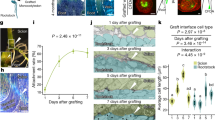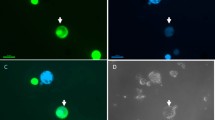Abstract
Two methods—breeding and the eye-excision technique of Asseyeva1—have been extensively used in the investigation of suspected periclinal chimeras in potatoes. They both give information on the LII layer at the stem apex (eye-excision may also sometimes apparently give information on LIII). Evidence on the constitution of LI can be obtained for certain chimeras by X-ray treatment2, but there is at present no method which gives definite information on LIII. One obvious way of investigating the LIII of chimeras would be by way of buds produced on roots. A method of producing root buds in potatoes has now been found and is described here. Similar methods might be successful for other plants which do not normally produce root buds.
This is a preview of subscription content, access via your institution
Access options
Subscribe to this journal
Receive 51 print issues and online access
$199.00 per year
only $3.90 per issue
Buy this article
- Purchase on Springer Link
- Instant access to full article PDF
Prices may be subject to local taxes which are calculated during checkout
Similar content being viewed by others
References
Asseyeva, T., Bull. App. Bot. (Leningrad), 27, 135 (1931).
Howard, H. W., Rad. Bot. (in the press).
Thijn, G. A., Euphytica, 3, 28 (1954).
Author information
Authors and Affiliations
Rights and permissions
About this article
Cite this article
HOWARD, H. Experimental Production of Buds on the Roots of Potatoes. Nature 203, 1303–1304 (1964). https://doi.org/10.1038/2031303b0
Published:
Issue Date:
DOI: https://doi.org/10.1038/2031303b0
This article is cited by
-
The ‘Jørgensen’ method, does it produce adventitious sprouts from potato?
Potato Research (1974)
-
A suggested method for investigating L1 constitution in periclinal potato chimeras
Potato Research (1972)
-
A full analysis of a potato chimera
Genetica (1969)
-
Induction of adventitious buds on roots of the potato
Euphytica (1967)
-
Chimerical Nature of the Entire-leaf Variant in the Potato Variety ‘Majestic’
Nature (1965)
Comments
By submitting a comment you agree to abide by our Terms and Community Guidelines. If you find something abusive or that does not comply with our terms or guidelines please flag it as inappropriate.



